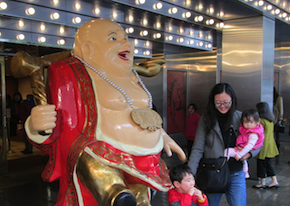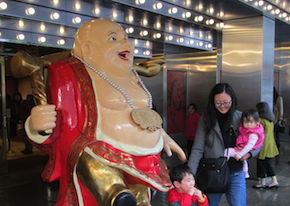
Photos by Janos Gereben
I wish lunar new year happened once a month — it's the perfect holiday, and you can celebrate its rituals and special food with Korean, Mongolian, Tibetan, and Vietnamese friends, among others.
Then, more to the point, there is the Chinese New Year and the San Francisco Symphony's annual (only) concert to mark it, one of the more entertaining events in and around Davies Symphony Hall, in a city where almost one-fourth of the population is of Chinese descent:
A full house of festively dressed audience, excited (but well behaved) children, Chinese decor outside and inside, free food from Panda Express, delicious jasmine and oolong tea, an acrobatic dragon dance (glowing in the dark this year), special artists, the entire orchestra on the stage, and — delightfully this time — a very short speech. (It wasn't always thus.)
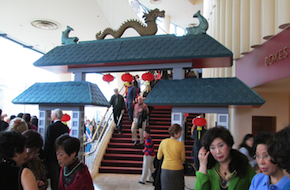
For veterans fans of this special event, such as present company, there is also reminiscing the unforgettable San Francisco debut at the 2005 Chinese New Year concert of pianist Yuja Wang, at age 18.
This year, the 14th such an event, greeting the arrival of the Year of the Horse ("animated, active, energetic, loves to be in a crowd," such as concerts), was another young woman — the opposite of a newcomer, and somebody intimately linked with the orchestra all her life.
Alina Ming Kobialka, 17, is the daughter of Daniel Kobialka, former SFS principal second violinist (1975–2008) and of violinist Chunming Mo, member of the orchestra since 1991.
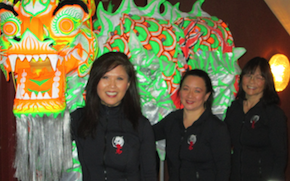
Alina truly grew up with the orchestra, beginning her studies at age 5, first with her parents, then with Li Lin, and winning first prize in the Chinese Music Teachers Association of Northern California Competition just a year later.
At 13, she won the SFS Youth Orchestra competition, and performed the Tchaikovsky Violin Concerto with the orchestra. She was concertmaster of the SFS Youth Orchestra, touring Europe, and many solo assignments followed.
On Saturday, she represented her own Chinese-Western double heritage by playing solos in the 1818 Ambush from All Sides and Franz Waxman's Carmen Fantasy, originally written for the 1946 film Humoresque. Jasha Heifetz, no less, performed and recorded these virtuoso variations on Bizet's opera score, and it has been used as a star vehicle ever since.
Kobialka played the Fantasy with power and ease, highlighting the great themes, but not milking them. Conductor Lan Shui supported the soloist here with a more shaded orchestral performance than he produced elsewhere in the concert.
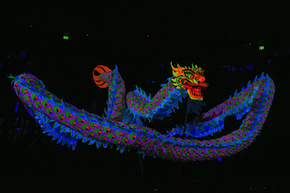
Photo by Moanalani Jeffrey
Rhythmic and dynamic excess was acceptable in Ambush, a fast, loud piece depicting the 202 BCE battle between Han and Chu armies, and a subsequent trick by and victory for Liu Bang, who became emperor (known posthumously as Emperor Gaozu), and founder of the Han Dynasty, which ruled over four centuries.
Here, Kobialka's virtuoso solos impressed all the more after her brief "lecture demonstration" of the themes, received by appreciative shuffling of feet in the orchestra.
Lan Shui, whose career has spanned leading the Beijing Symphony and working with Leonard Bernstein at Tanglewood, paid bicultural tribute to Spring, with a bright, boisterous Overture to the Spring Festival Suite by Li Huanzhi and Johann Strauss' Voices of Spring waltz, the latter missing the usual soprano soloist, although it's danceable enough just from the orchestra.

Photo by Janos Gereben
Australian pianist David Fung led the way in the second half of the concert, as the soloist in Quigang Chen's Er Huang, a popular new work, a blend of Chinese folk music and Western orchestral treatment. Chen, who served as the music director for the 2008 Beijing Olympics, had the brief work — based on the Beijing opera melody "Er Huang yuan ban" — premiered in 2009 by Lang Lang and the Juilliard Orchestra, under the direction of Michael Tilson Thomas.
Chen is another Chinese musician with bicultural credits; he was graduated from the 1978 class of Beijing's Central Conservatory (immediately after the devastation of the Cultural Revolution) and went on to study with Olivier Messiaen.
Two popular Chinese works concluded the concert: Ren Guang's riotous Colorful Clouds Chasing the Moon from the 1930s, and the traditional Good News from Beijing Reaches Border Villages — originally written for guzheng, but used here in the orchestral transcription.

